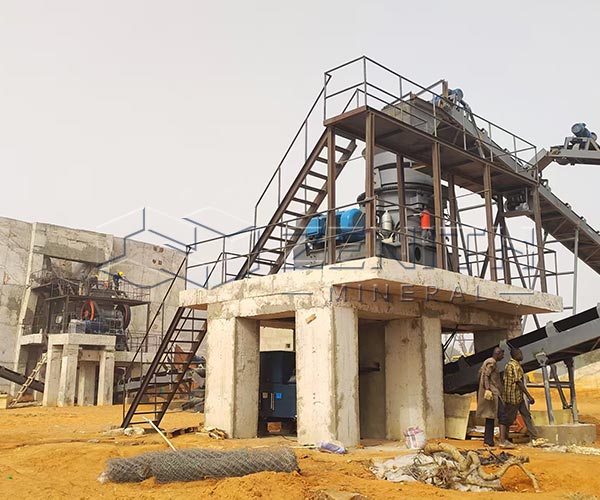
How Much Does a Stone Crusher Machine Cost in Ethiopia
Ethiopia’s booming construction and mining sectors have increased the demand for stone crusher machines, essential for processing basalt, limestone, and other materials used in infrastructure projects. However, the cost of these machines varies widely based on factors like type, capacity, brand, and import logistics.
Understanding the Types of Stone Crusher Machines Available in Ethiopia
- Jaw Crushers: Used for primary crushing, jaw crushers handle large rocks and offer high reduction ratios. They are ideal for processing Ethiopia’s basalt deposits, commonly found near Addis Ababa and Mekelle. Prices typically range from $30,000 to $500,000, depending on capacity (80–1500 tons per hour) and features like hydraulic adjustments.
- Cone Crushers: Designed for secondary or tertiary crushing, cone crushers provide finer output and are suited for medium to hard materials. They cost between $150,000 and $1 million, with high-end models featuring advanced hydraulic systems for efficiency.
- Impact Crushers: Versatile for medium-hardness stones, impact crushers range from $50,000 to $800,000. They are popular for producing construction aggregates but require frequent maintenance due to wear on plates.
- Mobile Crushers: Highly sought after in Ethiopia due to their portability, mobile crushers (e.g., mobile jaw or cone crushers) cost $120,000 to $550,000 for capacities of 60–150 m³/h. They are ideal for projects requiring frequent relocation, such as road construction.
- Mini Crushers: For small-scale operations, mini stone crushers start at a few thousand dollars, with mid-range models costing $20,000–$30,000. These are suitable for confined urban settings or small quarries.
Factors Influencing Stone Crusher Machine Costs in Ethiopia’s Market
- Machine Type and Capacity: The type of crusher and its output capacity significantly affect the price. High-capacity machines (e.g., 500 tons per hour) are pricier due to robust construction and advanced features, while smaller units are more affordable but less versatile.
- Import Duties and Transportation: Ethiopia imposes import duties of 25–30% on crushing equipment, increasing costs for foreign-made machines. Transportation from manufacturers, often in China, adds 3–5% to the final price, especially for bulky stationary plants.
- Brand and Technology: Reputable brands like Zenith offer reliable machines with advanced features (e.g., energy-saving mechanisms), commanding higher prices. Locally manufactured or refurbished options may be cheaper but lack durability.
- Market Demand and Supply: High demand from Ethiopia’s construction boom can drive up prices, while oversupply may lead to discounts. Seasonal fluctuations and economic conditions also play a role.
- Maintenance and Operational Costs: Machines with energy-efficient technologies or low-maintenance designs (e.g., self-lubricating mobile crushers) may have higher upfront costs but reduce long-term expenses.
Typical Price Ranges for Stone Crusher Machines in Ethiopia’s Context
- Basic Models: Entry-level jaw crushers (40–60 tph) start at around $30,000, while small mobile crushers cost $120,000–$150,000. These are suitable for small-scale quarrying or rural projects.
- Mid-Range Machines: Cone crushers or mobile plants with 100–150 tph capacity range from $150,000 to $550,000. These are common in medium-scale operations near Bahir Dar or Dire Dawa.
- High-End Units: Heavy-duty gyratory or large cone crushers for large-scale mining can cost $300,000 to over $2 million. These are used in major projects with high output needs.
- Complete Plants: A full mobile crushing plant (150 tph) costs approximately KES 80–110 million (roughly $600,000–$850,000 USD), including jaw, cone, and screening units. Stationary plants are pricier due to installation costs.
- Mini Crushers: Small-scale crushers for limited budgets start at $2,000–$5,000, with more robust models at $20,000–$50,000, ideal for niche applications.
Practical Tips for Optimizing Stone Crusher Purchase Costs in Ethiopia
- Match Equipment to Project Needs: Avoid over-specifying by selecting a machine that aligns with your project’s scale and material type. For example, a mobile jaw crusher suits small, mobile projects, while a stationary cone crusher is better for large quarries.
- Consider Energy Efficiency: Opt for models with energy-saving features to reduce operational costs, especially in Ethiopia, where power costs can be high. These machines may cost more initially but save money over time.
- Explore Refurbished Options: Refurbished crushers from reputable suppliers can be 10–15% cheaper than new ones, offering cost savings for budget-conscious buyers. Ensure warranties and service support are included.
- Negotiate with Suppliers: Partner with trusted manufacturers like Zenith or Liming, which have offices in Ethiopia, to secure discounts or favorable payment terms (e.g., T/T, L/C). Bulk purchases may also lower costs.
- Factor in After-Sales Support: Choose suppliers offering training, spare parts, and local maintenance services. Companies like Zenith provide engineers in Nairobi, reducing downtime and repair costs.
Challenges and Considerations When Buying Stone Crushers in Ethiopia
- Regulatory Compliance: Ethiopia’s environmental regulations require dust and noise control, which may necessitate additional investments in eco-friendly machines. Non-compliance can lead to fines or project delays.
- High Initial Investment: Small and medium-sized businesses may struggle with the high upfront costs of modern crushers, particularly imported ones. Financing options or leasing may help mitigate this.
- Logistical Challenges: Transporting heavy equipment to remote sites like Mekelle can be costly and complex, requiring specialized trailers or cranes. Modular mobile crushers reduce on-site installation needs.
- Maintenance Needs: Machines like impact crushers require frequent part replacements, increasing long-term costs. Opt for durable models with high-quality materials to minimize downtime.
Making an Informed Stone Crusher Purchase in Ethiopia
Purchasing a stone crusher in Ethiopia involves balancing cost, capacity, and project requirements. Prices range from a few thousand dollars for mini crushers to over $2 million for high-capacity plants, influenced by import duties, machine type, and market dynamics. By selecting the right equipment, prioritizing energy efficiency, and partnering with reliable suppliers, buyers can optimize costs and ensure long-term profitability. Ethiopia’s growing infrastructure needs make stone crushers a valuable investment, provided buyers plan strategically and consider both initial and operational expenses.

